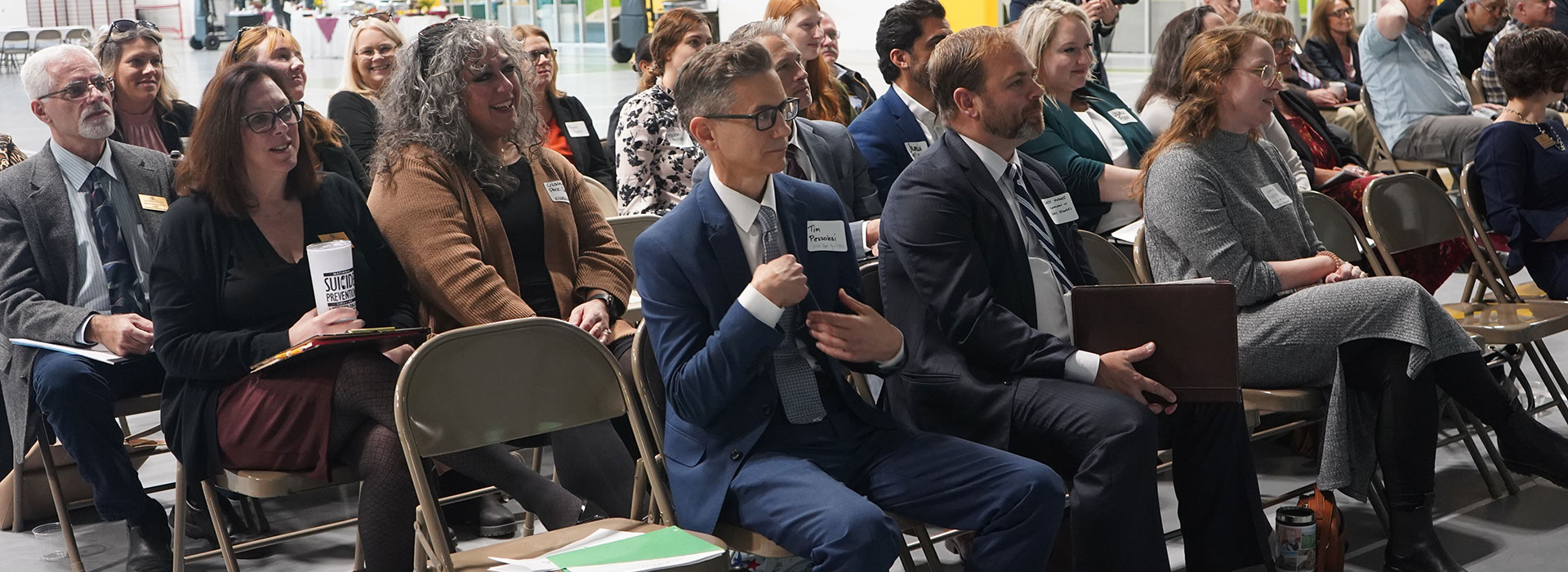Agenda
- 8-10 a.m. – Advisory Board Meetings or facility tours – various locations (TBD by program)
- 10-10:15 a.m. - Networking, coffee/refreshments – (STUAC Theater/lobby)
- 10:15-11- a.m. - Keynote Speaker Presentation
- 11:15 a.m.-12:15 p.m. - Breakout sessions - (STUAC Theater/Crawford Hall Rooms 108, 110, 116)
- 12:15-1 p.m. - Lunch - STUAC, Mustang Alley
- 1-3 p.m. – Advisory Board Meetings or facility tours
Keynote
Keynote Speaker and Topic: Brice Nordquist, PhD (he/him), Associate Professor of Writing & Rhetoric, A&S Dean's Professor of Community Engagement, Engaged Humanities Director, Narratio Fellowship Co-director
The Entangled Institution: Tracing the Roots of Sustainability
Modern educational institutions are often depicted as segmented, linear, and hierarchical, a structure that's shaped policies, curricula, and physical spaces for about 150 years in the U.S. While this model has brought significant social and economic benefits, it now seems increasingly misaligned with a world of permeable boundaries, precarious work, increasing automation, and institutional distrust. Facing these existential challenges, many assert that our traditional models cannot endure. This presentation explores a more hopeful view: educational institutions are never as bounded and static as we imagine them to be. Drawing lessons from Syracuse University's Engaged Humanities Network, Nordquist examines how teaching, learning, research, creative work, and collective action necessarily intertwine across and beyond our institutions. He argues that to create environmentally, socially, and economically responsive and sustainable institutions, we must articulate and strengthen these existing infrastructures of entanglement.
Bio of Keynote Presenter
Brice Nordquist is an Associate Professor of Writing Studies & Rhetoric and Dean’s Professor of Community Engagement in the College of Arts and Sciences at Syracuse University. He is a community-engaged literacy researcher and teacher who works through ethnographic and participatory research and public arts and humanities projects to study and support students’ movements across contexts of learning and stages of education. He is the co-founder and co-director of the Narratio Fellowship, a storytelling program for resettled refugee youth in collaboration with the Metropolitan Museum of Art, and the founder and director of the SU’s Engaged Humanities Network, which develops and interconnects publicly engaged research, teaching, and creative work across communities in Syracuse and beyond.
Breakout Sessions
Breakout Session One - Crawford 108
Title: Transitioning Workforce to Green and Blue Economies
This session provides an overview of green and blue economies, global trends driving this transition and the implications and possibilities for workforce development. It will also focus the importance of interdisciplinary education and industry and higher education partnerships to guide this transition.
Presenter
Tara Shimer, Workforce & Partnership Specialist, SUNY Morrisville
Breakout Session Two - Crawford 110
Title: College in Prison
Herkimer Community College and SUNY Morrisville team up to offer technical courses in renewable energy for incarcerated individuals. Come join us for a discussion with Herkimer and Morrisville instructors about this unique outreach opportunity and teaching experience.
Presenters
- Karen Scott, Coordinator of the College in Prison Program at Herkimer College
- Sam Doubleday, OWTI/RETC Outreach Coordinator and Adjunct Instructor, SUNY Morrisville
- Jeremy Scibetta, OWTI/RETC Outreach and Adjunct Instructor, SUNY Morrisville
Breakout Session Three - Crawford 116
Title: Building Sustainable and Interconnected Communities through Food Systems
Facilitator: Syracuse University Engaged Humanities Network
In this session, researchers and teachers from the EHN will sketch out an infrastructure for transdisciplinary and cross-community work around food systems. Facilitators will lead separate small group activities in storytelling, systems design and plant ecologies and will come back together to discuss models for collaboration across projects, programs and communities.
Further rooms if needed:
- Crawford 107 Lecture Hall
- Crawford 203 Conference Room


